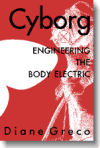
"Greco has made use of hypertext technology to create a cyborg text...
Its hybrid form is so completely interwoven with the electronic
prostheses through which we encounter it that the cyborg body is the
text, and the text is the cyborg body. Which, I take it, is precisely
Greco's point." -- N. Katherine Hayles, American Book
Review
![]()
"Diane Greco's Cyborg is a singular, extraordinarily adept
foray into contemporary metaphysics as it has been inflected by
technological change. At once both a subtle work of art and a
deeply intuitive philosophical treatise, it not only asks our
most troubling questions about what it means to be human, but answers
them through informed appropriations of current theorizing in
feminism, deconstruction, and virtualism. The work embodies (all
puns denied!) the aspirations of Derrida's trace and
jouissance, as well as Gibson's, Haraway's, and Stone's
decategorizations of gender and organicism, within a hypertextual
reading that recalls yet other recent theorizing by Bolter, Hayles,
Moulthrop and others. Still, it is Greco's own voice that prevails in this
tour de force meditation on the intersections of the fictional and the
real, the artificial and the originary. " -- Burt Kimmelman, New Jersey Institute
of Technology
![]()
Cyborg energized my students about both cyborgs and hypertext. The rich array of references and concepts enabled exciting discussions and dazzling projects." -- Bryan Alexander, Centenary College
 Part human and part machine, the cyborg is a familiar figure in cyberpunk science fiction. But this figure looms ever larger -- as metaphor and as reality -- in all our lives. Today, cyborgs are real; in cyberspace, we are all cyborgs.
Part human and part machine, the cyborg is a familiar figure in cyberpunk science fiction. But this figure looms ever larger -- as metaphor and as reality -- in all our lives. Today, cyborgs are real; in cyberspace, we are all cyborgs.Diane Greco explores the significance of the cyborg in 20th century writing. from Thomas Pynchon and William Gibson to Haraway and Derrida. The cyborg is more than just an interesting fiction; Cyborg: Engineering The Body Electric explores cyborg's impact on political action and personal identity.
After reading Cyborg, you'll never again look at your body (or someone else's) quite the same way.
If cyborgs know about anything, they know about parts. Spare parts, parts and wholes, prostheses, replacements, enhancements. How do you make sense of all these pieces? After the disaster, when things fall apart, cyborgs know how to stitch themselves back together.
- Introduction
- Your Body Is Meat
- Machine Dreams
- Mind, Body, Anti-Body
- Cyborg Visions
- Communication & Control
- Writing The Cyborg
- What Do Cyborgs Know?
Cyborg: Engineering The Body Electric
by Diane Greco
ISBN 1-884511-22-8
Editions for Macintosh and Windows $49.95
About the author:
Diane Greco
Don't miss:
Socrates In The Labyrinth by David Kolb
Fragments of the Dionysian Body by Eric Steinhart
Previous Page
Next Page


